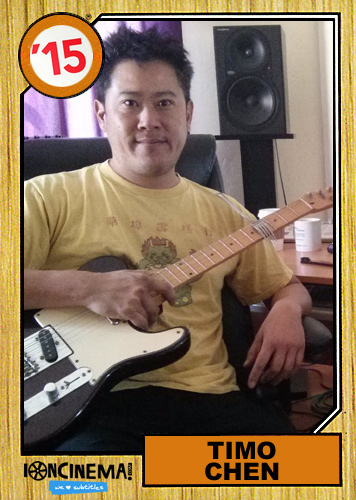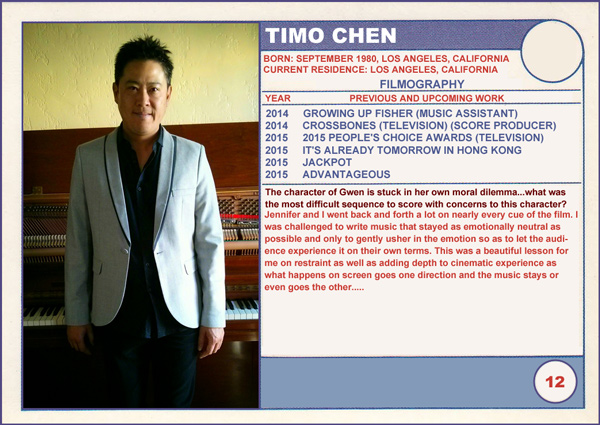Eric Lavallee: Name me three of your favorite “2014 discoveries”…
Timo Chen: I worked a lot in 2014 so I didn’t get out much. That said, I was able to recall three things that I discovered that changed a few things in my life.
• Learning to solder and then learning that you could learn just about anything on youtube. I had previously only used electrical tape and sloppy fixtures for all my electronic music endeavors. I told myself that I had to learn how to solder so I looked it up on youtube and was blown away by how many enthusiasts there were giving detailed instruction on something as commonplace as soldering. Then I started doing the same with carpentry and building more and more things–fixtures around the studio, etc. Learning to teach myself to build things was a huge discovery for me in 2014.
• Two pieces of music: Te Deum by Arvo Pärt. What a fantastic piece that I regret that I had not heard earlier in life. Symphony No 1 by John Corigliano. I attended a performance of this piece by the L.A. Phil and sat in the 3rd row. had never heard this piece live before. I was in tears after that performance–not because it was sad, but because it was so beautiful and inspiring.
• The Philae probe landing on a speeding comet. My father worked at JPL nearly his entire adult life so I have always had an interest in physics, engineering, and astronomy.
Lavallee: Jennifer Phang’s Advantageous takes place in a distant future. How is sci-fi represented musically?
Chen: As it would have been easy to just jump in and use futuristic sounding synthesizers, I naturally made things difficult for myself and had some more fun. After much discussion with Jennifer, I presented with her an idea of keeping in line with the core of the film which remains more focused on the human condition responding to a dystopic future, rather than that future itself. As a result, I approached the soundtrack by using very traditional instruments from all over the world, but developed and used different ways of playing and recording them. I wanted the instruments to be familiar, but not sound completely familiar.
I first took these instruments and rather than just using traditional microphones, I built contact microphones for them to capture a more thin and harsh essence of their normally rich sonic qualities. This harsh lo-fi sound, to me, would start to represent some sort of harsh presence encroaching on something that would normally be pure.
Then I looked for different ways of playing these instruments. As the human ear detects a ton of information at the attack of any sound, it was important for me to get replace the attacks. So I ended up playing the violin, piano, guitar, and guzheng using toothbrushes, vibrators, spoons, and even something I co-built with a friend of mine we call the “Jimbow.” The result is what I believe to be a highly experimental score in terms of sonic textures, but if you listen to any of the sounds long enough, you might be able to hear an instrument you’re normally familiar with.
Lavallee: The character of Gwen is stuck in her own moral dilemma…what was the most difficult sequence to score with concerns to this character?
Chen: Jennifer and I went back and forth a lot on nearly every cue of the film. I was challenged to write music that stayed as emotionally neutral as possible and only to gently usher in the emotion so as to let the audience experience it on their own terms. This was a beautiful lesson for me on restraint as well as adding depth to cinematic experience as what happens on screen goes one direction and the music stays or even goes the other.
The one cue where Gwen speaks with Fischer and looks back at her decision and all that has come from it was the most difficult for me because I was so tempted to go bigger and bigger and build. But with every pass I turned in, I was instructed to chip away at like a sculptor to a block until I was left with a sculpture. It was a wonderful process that resulted in a beautiful sculpture. And then of course when we got to that sculpture, we decided it as the wrong sculpture and had to start over again. Twice. In the end, I was very happy to have gone through this process and end up with a cue that I believe is very effective to the scene as well as able to stand on its own as a unique piece of music.
Lavallee: We heart film scores. We’d like to know what are some overlooked or forgotten film scores that are worth a listen/discovering?
Chen: I heart film scores and I also really heart the soundtrack for “I Heart Huckabees” by Jon Brion. There are so many quirky and over-the-top lo-fi textures he uses all throughout and he doesn’t really separate acoustic or electronic sounds at all. They work together great.
I also really love bt’s score for, “Monster.” He was one who inspired me a lot to break out the spoons and toothbrushes and use those to strike the strings of a piano or a guitar, but beyond that there were simple beautiful melodies on top of those textures.
And finally, although he won an Oscar for it Tan Dun’s work on “Crouching Tiger Hidden Dragon” is often overlooked. I feel it is one of the finest examples of combining Chinese and Western music in a way that is not stereotypical or touristy. And on top of all those east-meets-west textures, you have the beautiful playing of Yo-Yo Ma.




